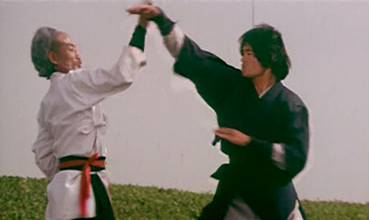|
It's
the early days of the Qing Dynasty, and the Ming General
Chen Chang Kung has fled to Taiwan with a price on his head.
Top fighter Shung Ching Kwei works for a Qing field marshal,
but when a disagreement results in him beheading his own
boss, he heads for Taiwan to join Kung's army in exile,
pursued by hand-picked warriors of Qing lord To Ko Lan.
On his road to escape, Kwei encounters Keigi, a beautiful
woman of Japanese descent who is living by her wits (stripping
off during gambling matches to distract the other players,
for example), and northern kickboxing champion Sun Hsin,
who pops up every now and again to aid Kwei when things
get too tough. But Kwei's biggest battle will prove to be
with To Ko Tan himself, a fighter of formidable and dangerous
skill who is determined to bring Kwei down.
Honestly,
do you really care about these plot details? If you're a martial arts film fan then you'll already know that the prime
purpose of most genre narratives is not
to wax lyrical on the politics of Chinese history or the
human condition, but to establish who the good and bad guys
are and get them into fights. If you're new to this film
then you'll only want to know one thing: are those fights
any good? Well the short answer is yes. The long answer
is bloody hell yes.

Wong
Tao and John Liu play Shung Ching Kwei and Sun Hsin respectively,
re-united after their co-starring role in James Nam and
See-Yuen Ng's 1976 Secret Rivals [Nan
quan bei tui] and here at the top of their game.
This is old school kung fu at close to its best, the fight
choreography and martial arts skills of its stars making
for some superb and sometimes lengthy fight sequences, including
impressive woodland and riverside battles with two swordsman,
and a climactic three-way duel in which Kwei and Hsin join
forces in an attempt to defeat the mighty To Ko Lan, who is played
by Eagle Han Ying, a fighter of considerable skill who represents a credible
challenge for the two.
John
Liu tends to come off best on screen, in part because of
his consistently cheery demeanour (Kwei takes himself way
too seriously and clearly needs to loosen up a bit), but
also because the northern kickboxing style is so visually
impressive, especially as demonstrated by Liu, who can execute
a string of impressive kicks without lowering his leg or
dropping his grin once. It's also he who suffers least from
the sometimes hilarious English voice dub,
which reaches an almost parodic peak with the scroll-waving
messenger, where an attempt to match the mouth movements
of the original Mandarin dialogue results in lines growled out in
the fractured monotone of a malfunctioning robot on the
verge of complete mechanical failure. On top of that, the
score seems to have been lifted entirely from other movies,
most recognisably the main theme from Ennio Morricone's
score for Hang 'Em High.
But
if you can tolerate this and the toilet paper-thin storyline – and if you're a martial arts cinema fan of some years
standing then you'll be on familiar turf here – then Death
Duel of Kung Fu definitely deserves your attention.
The fights are very well staged, the pace is breezy and
director Sum Cheung knows well how to stay out of the way
of his performers and best showcase their talents.
The
shocking state of the transfer on The 55th Chamber's release
of My Kung Fu
12 Kicks left them with nowhere to go but up,
and although the print here takes a step in that direction,
it's a depressingly small one. Mind you, this very transfer
has already made an appearance on UK DVD a few years back
at the hands of DVD.com, making this effectively a re-release.
The opportunity to right the original wrong has thus
been sadly missed.
It's
not all bad. The colours sometimes are OK and the detail is occasionally rather good, and unlike 12
Kicks the picture is actually widescreen. Well,
when I say widescreen I mean 1.66:1, which would all be well
and fine if the correct aspect ratio were not 2.35:1, which
we are given a frustrating taster of in the pre-title sequence. A bigger problem is the state of the original
print, which is plastered with dust and scratches and even
the odd gob of splicing glue, with most of the reel changes
announced in advance by a dance of dirt and sudden jumps on the soundtrack.
The contrast and sharpness are wildly variable and things
completely nose-dive at the end when the picture rolls up
and is eaten alive by dust. The fact that it is not anamorphically
enhanced and appears to have been converted from an NTSC
original just compounds these problems.
The
soundtrack is similarly schizophrenic. Horrible voice acting
aside, the dialogue, sound effects, music and underlying
hiss are intermittently muffled for five minutes at a time,
making it sound as if your speakers have been shoved into
a large and hairy sock.
The Death Duel of Kung Fu UK Promotional Trailer
(0:56) is basic stuff and follows the trend set by the film
by opening at 2.35:1 and then switching to 16:9.
Other
Exciting Releases and Web Links
are self-promotional and of no real interest.
As
someone who grew up with and still cherishes the pleasures
of old school kung fu films, Death Duel of Kung
Fu is a minor nostalgic treat, a series of splendidly
choreographed and performed fights strung together by a
plot I had to consult my notes to even remember. It deserves
to be lovingly restored and given a Bey Logan commentary,
but instead we get a re-issue of the same cropped, non-anamorphic,
astonishingly messy print from the previous release, with
a soundtrack to match. Not bloody fair.
|